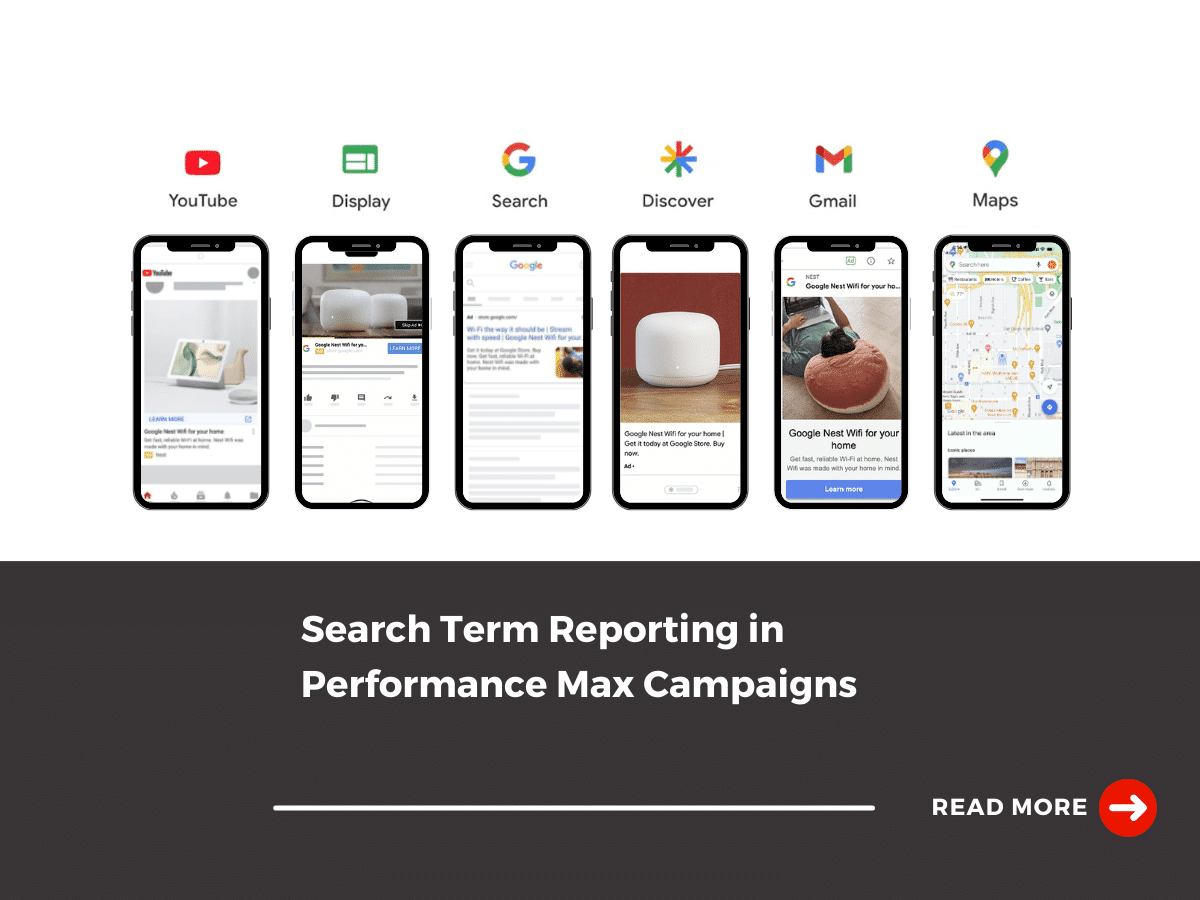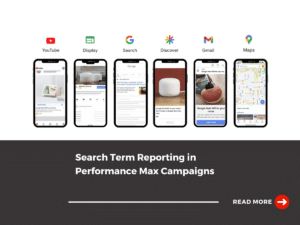In August 2023, Google added a new feature to their Performance Max campaigns called search term reporting. Before August, marketers could only see the search category reports, not the complete search term reporting list. The search term report didn’t have the data and analysis needed to make meaningful changes to PMAX campaigns.
This new reporting feature provides invaluable insight into the opportunities and challenges standing in the way of your ad’s full potential. With the help of search term reporting, you can better understand which keywords have the highest CPC and find non-relevant keywords that you need to eliminate.
In this article, we’ll discuss the importance of the new Performance Max reporting features and how to use Performance Max negative keywords to improve your campaigns.
Here’s everything you need to know:
What is a Performance Max Campaign?
Performance Max campaigns are ad campaigns powered by Google’s AI algorithm that launched in 2021. This campaign type helps businesses choose ad placements based on user experience. In the past, businesses would need to create different campaigns for different campaign types. Uploading your assets for search result ads, shopping ads, and YouTube was a monotonous process that took longer than needed.
Performance Max campaigns consolidate the process, allowing brands to access a variety of ad placements with one set of product info and inventory. The new ad campaign type does what multiple campaigns used to do. This helps streamline the ad creation process and makes ads more efficient.
Performance Max vs. Smart Shopping Campaigns
By the end of 2022, Performance Max had replaced the Smart Shopping Campaign type previously used. Some of the main differences between Smart Shopping Google ads and Performance Max Campaigns include:
- New targeting capabilities
- Use of smart bidding
- Ability to use third-party scripts
- More control over your budget, bidding strategies, and audience signaling
Understanding The Power of Keywords
Google’s algorithm uses keywords to decide when and where your ads should be shown to individuals. They are the driving force in the campaign process and are vital to the success of your paid initiatives on Google.
The keywords you select for your campaign are uploaded to the ad group level and associated with a match type. There are three main keyword match types. This includes:
- Broad Match: The ad will show relatable keywords
- Phrase Match: The ad will show phrases that have the same meaning as your keyword
- Exact Match: Ads may only show for exact keyword matches
Here’s an example of how this would look:
- Broad Match: Black Prom Dresses
- Phrase Match: Black Homecoming Dresses Near Me
- Exact Match: Black Homecoming Dress
Keywords are the building blocks for Google ads. These keywords tell Google’s algorithm when and where to show your ads. Google typically recommends a combination of all three match types to maximize the efficiency of your campaigns. This means that non-relevant search terms may filter into your campaigns at any given time.
Marketers need to keep an eye out for non-relevant keywords to add them to their list of negative keywords.
What is Search Term Reporting?
A PMX search term report is a list of keywords individuals have used in their search queries, and your ads were shown. This list may vary from the keyword list you have uploaded to Google and feature a combination of broad, phrase, and exact matches.
When looking through a search term report, you may find a handful of terms you want to add to your negative keyword list. These terms aren’t relevant to your ads you don’t want your ads to show for.
Why Search Term Reporting for PMAX is Important
When PMAX campaigns first launched in November 2021, marketers did not have access to the PMX search term reporting feature. This means you can’t see which keywords your ads are showing for. Google only revealed different search term categories, but none of the data and analysis that supports it.
In August 2023, Google updated its Performance Max reporting, providing marketers access to detailed PMAX search term reports. These search term reports identify negative keywords and different keywords that have potential.
With the new reporting feature, marketers can avoid spending too much ad spend on keywords that aren’t garnering results. This helps you refine your search results while still taking advantage of the three different match types.
How to use Performance Max Negative Keywords
Once you identify your negative keywords, you can’t just manually add the negative keywords to your campaign like traditional Google ad campaigns.
There are two ways to add your Performance Max negative keywords. This includes:
- Asking Your Google Rep: If you have a Google rep, you must submit a list of negative keywords you want to add to your campaign for every campaign you plan on running. This is a tedious process that could slow down your productivity. Also, if you don’t have a Google rep, you may not know who to contact.
- Account-Level Negative Keywords: If you have Performance Max negative keywords you want to apply to all your campaigns, you can add them on an account level. However, you can’t add negative keywords to a specific campaign on your account at this time.
There is a third way to add Performance Max keywords without going through your Google rep when you want to add a new one. Here’s what you’ll need to do:
- Create a negative keyword list for your Performance Max campaigns inside of the Google Ad interface
- Send the Performance Max negative keyword list to your Google Rep or Google support
- Ask them to apply the negative keyword list to your Performance Max campaigns
- Whenever you have a new negative keyword, add it to the Google Ad interface
Implement Performance Max Best Practices With Kanbar Digital
Google’s Performance Max Campaigns are a powerful new ad campaign type that can help you streamline your paid ad initiatives and maximize results. At Kanbar Digital, our team has hands-on experience developing campaigns that deliver results. Our team is here to help you find challenges and opportunities within the PMX search term report and help you fine-tune your approach to your PPC campaigns.
Contact us today to learn more about our paid ad marketing.




